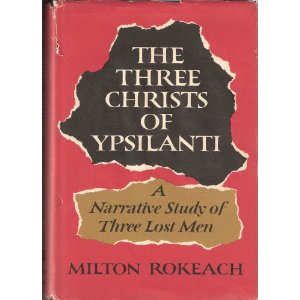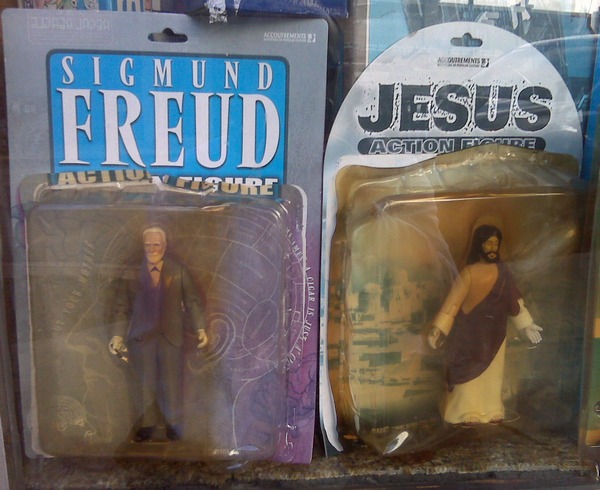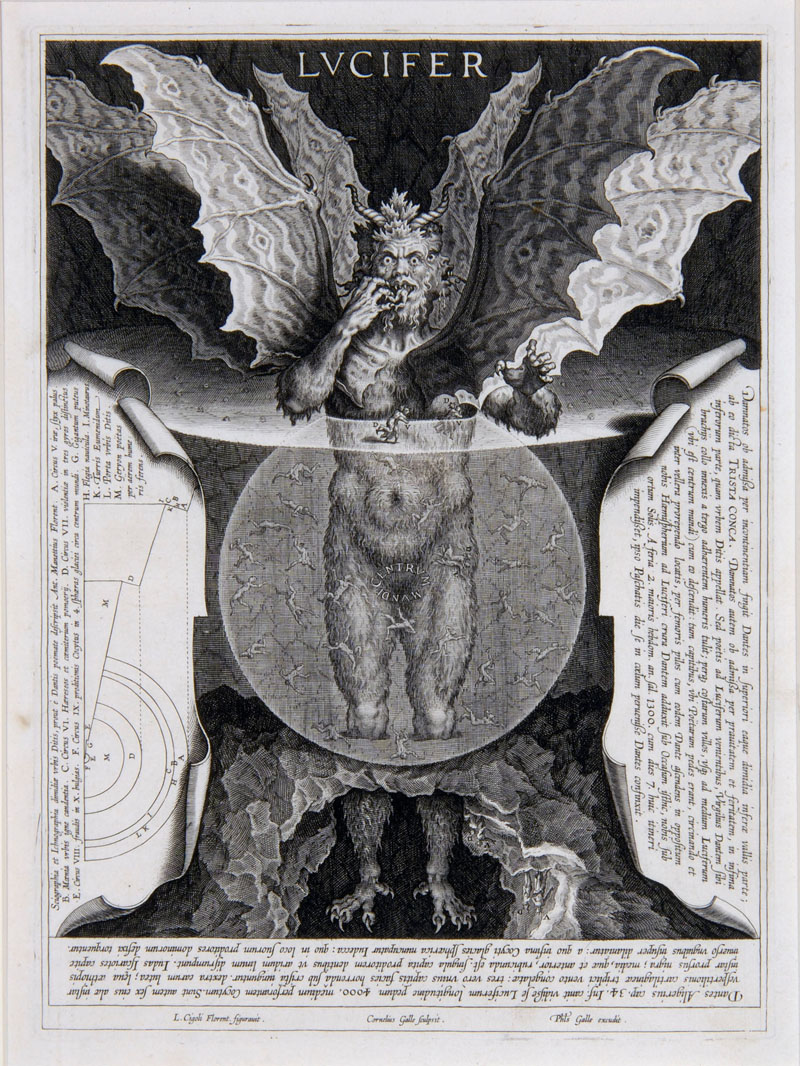Craft Notes
Don’t believe in writer’s block, but I do believe in analysis paralysis
I tried to write a thing about my favorite things of last year, but couldn’t narrow it down. All I could think of was the stuff I’ve been circling lately. Like, for instance, I’ve been reading The Three Christs of Ypsilanti, one of the best experimental novels I have read. Unfortunately it is a case study from the sixties, not a novel. But it was an experiment. And NYRB brought it back in April. I still haven’t read Rick Moody’s introduction. Probably won’t. I skimmed it. Saw the word “splendid.”
Basically, this psychologist Dr. Rokeach brought together three paranoid schizophrenics who believed they were Jesus, in order to poke around for certain excretions concerning the nature of identity. Because, how can there be more than one of the same person? Maybe the best thing about it is you know the dialogue is real, because they are being recorded, yet the three Christs are acutely aware of the recording process — one of them, Joseph Cassel, says he “was in the tape recorder once. There is a world in the machine.” Additionally, the three gods read a couple of articles, one in Newsweek, about the progress of their group meetings; and thus seem cognizant, if not psyched by the idea that people will read what they say. So the authenticity of their words is perhaps tainted by this notion of performance. But then, isn’t everything a performance? Is that not the one thing writers do or don’t do.
Any messiah is a performer. They arise in largely illiterate, impoverished areas of the world, in which people cling to beliefs because it is the only thing keeping them from smashing into the earth. They have too much reality, and crave magic. Most of us do not live in this reality (we seek magic in more clinical environs, like movie theaters, libraries, and computer screens), but that is the state of affairs in a publicly funded mental hospital — the food is bad, people speak in tongues, and the quality of light is poor — making it, actually, the ideal environment for the reincarnation of a messiah. One might think that an individual embodying Christ, the word of Truth, and ultimately God, would feel a tremendous responsibility for their words. But, like the authors of the Bible, these guys spew all sorts of contradictory shit.
Joseph saw himself as a great writer; this was a central theme both in his delusional system and in his everyday behavior. He told us that he liked to read good literary criticism, history and biography, and essays on art and architecture. Once, in a discussion of Madame Bovary, I asked Joseph who wrote it. “Flaubert,” he said. And when? “Around 1874.” And in answer to the question: “What is it about?” he was able to give a quite accurate account of the story. The discussion lasted about ten minutes and proceeded on an entirely realistic level. Then Joseph said: “You know, I really wrote Madame Bovary.”
—You did? I thought you just got through saying that Flaubert wrote it.—
“No, I did. Flaubert stole it from me. He took it to France.”
Yet with all his delusions, Joseph impressed us with his knowledge of literature and his developed literary tastes. Once during a meeting he pulled three books from his pocket, walked over to the window, and tossed them out, saying: “There isn’t a good line in the whole bunch.” Then, pulling Hugo’s Toilers of the Sea out of another pocket, he exclaimed: “This is a good book!”
A partial list of the books Joseph brought with him to the meetings, and which he had apparently read in whole or in part, included Clifton Fadiman’s Lifetime Reading Plan, Durant’s Story of Philosophy, Gibbon’s Decline and Fall of the Roman Empire, and Prescott’s Conquest of Mexico. When asked whether Prescott’s work was about the conquest of the Aztecs, Joseph replied: “Yes, but actually the Aztecs supplanted the Toltecs.” He was able, too, to discuss the history of Napoleon I and Napoleon III in quite realistic terms. But as soon as he had finished, he said: “In the War of 1870, I told the French to quit fighting or the Germans would ruin France completely.”
This is followed by a completely delusional discussion of the Christs’ mothers. When Joseph’s daughter was notified of his beliefs, she said, “He always wanted to be important, better than other people, but he just wasn’t aggressive enough.” Probably due to his interest in language, Joseph feels a strong connection to England, often asking to be deported to a hospital there so that he can work in peace. For Joseph, America is noise. Each meeting opens and closes by the men joining hands to sing a song from a songbook titled America, which Joseph was reading when they began the practice.
Another Christ, Leon Gabor, also highly literate, swerves between wishing to be known as Dr. Domino Dominorum et Rex Rexarum, Simplis Christianus Pueris Mentalis Doktor (he claims this is on his birth certificate) to Dr. Righteous Idealed Dung Sir to, simply, Dung. He is the novelist of this crew (though in truth, he mostly just blogs). He claims to perform miracles, such as lifting a table with his mind. When he demonstrates this for Dr. Rokeach, the doctor says he does not see the table float. Leon replies, “Sir, that is because you do not see cosmic reality.” Though he does not claim the desire to be a writer, he composes long letters to delusional entities, handing these to anyone working in the ward. When he reads an article about the Abominable Snowman, he spends a month absorbed in a letter addressed to the Yeti people. After handing this off, Leon stops talking about Yetis. This, of course, happens to novelists all the time. Upon publication, disinterest trolls in obsession’s wake. He denies authorship of a manuscript which he handwrote called Cause and Evolution, saying it was inspired by “the insanity of God.” When the three men are, as part of the project, appointed to an imaginary “Flora and Fauna Commission,” Leon writes and constructs a blank book in which he collects “cosmic photographs” of the various flora and fauna of the institutional grounds. He takes these cosmic photographs by imitating the act of photography. Kenneth Goldsmith would have blurbed him. Naturally, Joseph does not respect Leon’s writing. After the study ends, he writes this in a “report to nobody”:
So Dung will write reports again. How bad this is. His reports are so illy written. I, as God, Joseph Cassel, remember that prior to my campaign, I coerced Dung to do certain things in my campaign; this was conducive to his writing reports, but, of course, I must say that this was not too lovely, for the reports were bad, and he even signed my name to his reports. He must be watched closely. I say to the authorities, Watch this patient. He is not to be trusted. He wants to be this or that; he wants to be this or the other fellow. He wants to be be this woman or the other woman. He is an enemy. He cannot be trusted. He wants to destroy the world. He wants to be God. Watch.
Watch Dung and Benson, they are two enemies. They want to be God. I am God, the writer and worker for materials for these reports. Watch them.
Joseph explains that he writes these extremely long reports to nobody in order to “‘obtain the values of the classics and of the authors.’ He claimed that virtually all the authors whose work he was ‘copying’—and this included Aristotle, H.G. Wells, Freud, and Balzac—were imposters who had stolen from Joseph. By copying all this bibliographic material, Joseph hoped, magically, to beat and kill these enemies and ‘gunshots’ and thus to regain his ‘values,’ and once again become a strong God.” Joseph is a journalist. His reports are the most lucid, if damning, of the three. On Leon’s cosmic photography, “‘There’s nothing real about it,’ Joseph says flatly. He says he will refuse to co-operate with Mr. Dung. ‘He’s too full of friction.'”
The other Christ, Clyde Benson, doesn’t say a whole lot. Probably for this reason Leon claims that he is the foster child of a sandpiper. To which Clyde responds, “Castles are built on sand. We build on a solid foundation.” Occasionally though, he says something extremely insightful, such as: “Santa Claus represents God on assistance.” His belief, that he is the one true God, is seemingly unshakeable — much stronger than the other two. When Leon and Joseph fight over which of the three is God, Clyde gets angry, claiming he is the only one, then says the other two are dead and withdraws to a stupor. Obviously he is the poet.
In his afterword, Dr. Rokeach suggests that he too suffered from a God complex, that he played God in bringing these people together and manipulating the situation. He impersonated real and delusional entities in correspondence with the patients, attempting to use their positive authority as a catalyst to awareness. He rearranged their schedules and duties. He had total control over their lives, and says he was only cured when the project ended. After years of thinking about the three Christs, Dr. Rokeach concludes:
They were striving for goodness and greatness, and such strivings, I came to understand, are really the strivings of all human beings. The main difference between the three of them and the rest of us who are also trying to be God-like is that whereas the rest of us can bring ourselves to admit the impossibility of our ever becoming absolute or infinitely moral and competent, the three Christs found it difficult to admit such an impossibility.
But what makes the three Christs most like writers is an essential question Rokeach poses at the outset of the study, “As Helen Merrel Lynd writes: The search for identity ‘is a social as well as an individual problem. The kind of answer one gives to the question Who am I? depends in part upon how one answers the question What is this society—and this world—in which I live?'” The three Christs are the most creative when the logic guiding and guarding their delusions comes under scrutiny. Leon, the novelist, calls this “agitation.” It angers him. Joseph, the journalist, recognizes it, but is more entertained than anything else. Though he will admit, it “disturbs the peace.” The poet Clyde could not care less. During periods in which agitation does not occur, they are content to live as one of their flock — watching TV, working in the laundry room, reading — at peace with their delusions, creating nothing.
Tags: Jesus






Lol
Is calling a doll an action figure exemplary of “paranoid schizophrenia”?
this is amazing. does rokeach ever bring up ‘the influence machine’
great point on secular vs. profane magic, duly noted…
going to download the book and then come back and read this, it sounds awesome
love the freud/jesus action figure shot
That book is the best. “SQUELCH CHAMBER.”
Inspiration can be found in anything, for me it’s a glowy kind of feeling.
I wonder how many people have bought the Freud action figure just to stick it up their butt.
seriously believe way more people have this illness, but either know enough to keep their mouth shut, or write enough to work around it.
nope but i think you’ll like this part about dreams
there are are too many good lines in just that excerpt. jesus.
here’s wiki’s thing on the influencing machine:
http://en.wikipedia.org/wiki/On_the_Origin_of_the_%22Influencing_Machine%22_in_Schizophrenia
it’s ‘literally’ a machine that conducts electricity, but in the case of schizophrenia, it’s been transformed into a vague idea of a machine that informs, instructs, and commands the patient into action and/or belief. various articles i’ve read throughout mental health trainings have taken it a step further to explore literature as an influence machine, and more contemporary studies include television and the internet. delusion is belief.
Dig it. Thank you.
or their father’s butt, and lvcifer needs a manipedi and a body wax, the big cry baby
yeah, this is amazing